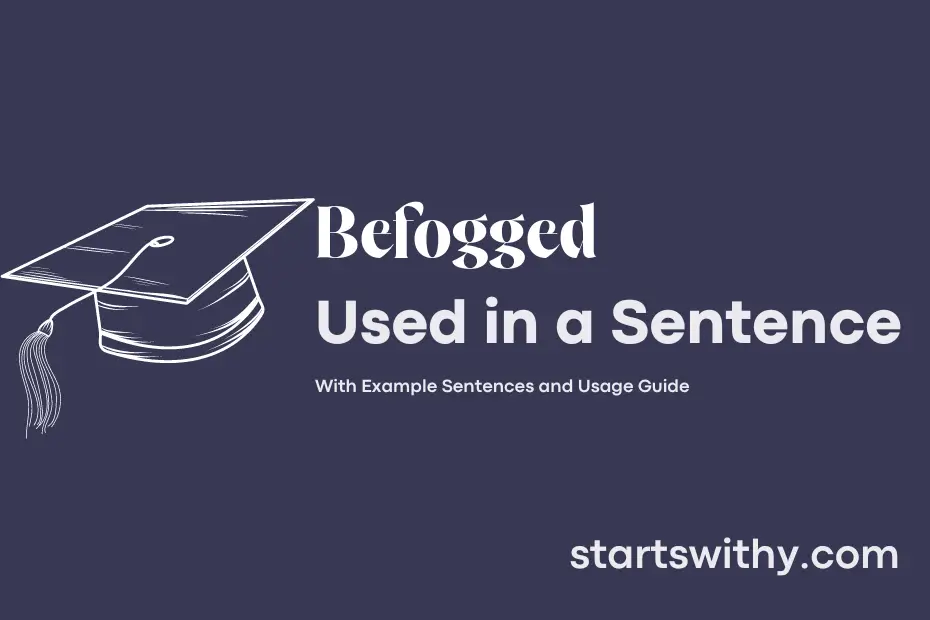Have you ever felt your thoughts clouded and confused, as if shrouded in a haze of uncertainty? This state of mental fogginess is often described as being “befogged.” When the mind is befogged, clarity of thought and decision-making can become challenging.
In a befogged state, individuals may struggle to focus, process information, or make sense of their surroundings. It can feel like trying to navigate through a dense fog, where details and solutions become obscured. Recognizing when you are befogged is the first step towards regaining mental clarity and sharpness.
7 Examples Of Befogged Used In a Sentence For Kids
- The foggy weather befogged the view of the mountains.
- His glasses were so dirty, they were befogged.
- The mirror in the bathroom was all befogged after I took a hot shower.
- The windows were befogged with condensation on a cold morning.
- The old photograph was slightly befogged from age and wear.
- The pond was so still and quiet, its surface befogged with mist.
- As the train moved through the tunnel, the windows became befogged with darkness.
14 Sentences with Befogged Examples
- Befogged by the complex equations, the students struggled to solve the mathematical problems.
- The late-night study session left the group feeling befogged and in need of a break.
- Befogged by the professor’s instructions, the student raised their hand to ask for clarification.
- After pulling an all-nighter to finish their project, the students were befogged and exhausted.
- Trying to remember all the facts for the exam left the students feeling befogged and overwhelmed.
- The dense fog outside mirrored the students’ befogged thoughts as they prepared for their final exams.
- The lack of sleep and intense studying left the students feeling mentally befogged.
- Befogged by the complicated research paper guidelines, the students sought help from their professor.
- The unexpected quiz left the students feeling befogged and unprepared.
- The confusing lecture left the students befogged and unsure of what to focus on for the upcoming test.
- The students’ minds were befogged with stress and anxiety over their upcoming presentations.
- Befogged by the sudden change in assignment requirements, the students scrambled to adapt their work.
- The overwhelming amount of information presented in class left the students feeling mentally befogged.
- The challenging group project had the students feeling befogged as they tried to come up with a cohesive plan.
How To Use Befogged in Sentences?
To use Befogged correctly in a sentence, start by identifying a situation where you want to convey a sense of confusion or lack of clarity. For example, “The dense fog befogged the entire city, making it difficult to see beyond a few feet.”
Next, ensure that Befogged is placed in the right context within the sentence. It typically works best when describing a state of confusion or clouded thinking. For instance, “His mind was befogged by the complex instructions, and he struggled to figure out what to do next.”
Remember to pay attention to the tense of the sentence and make sure it matches the context in which you are using Befogged. For example, “The smoke from the fire befogged the room, causing everyone to cough uncontrollably.”
Additionally, consider the tone and style of your writing when using Befogged. It is a formal word that might be more suitable for academic or professional contexts rather than casual conversations.
By following these tips, you can effectively incorporate Befogged into your writing to convey a sense of confusion or obscurity. With practice, you will become more comfortable using this word and enhancing the clarity and richness of your language.
Conclusion
In conclusion, the use of “befogged” in sentences adds a layer of complexity and uncertainty to the subject matter being described. Whether it relates to a befogged mind, befogged weather conditions, or befogged memories, this word paints a vivid picture of something obscured or unclear. The versatility of “befogged” allows for vivid and descriptive language in a variety of contexts, making it a valuable addition to one’s vocabulary.
By incorporating “befogged” into sentences, writers can effectively convey a sense of confusion, haziness, or lack of clarity. This word captures the essence of a foggy state, enabling readers to easily grasp the intended meaning and imagery. Overall, “befogged” serves as a powerful tool for enriching writing and engaging audiences with its evocative and descriptive qualities.



